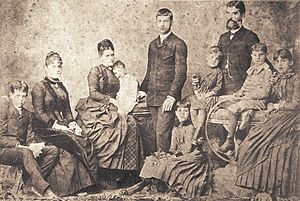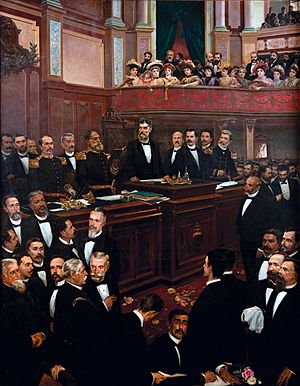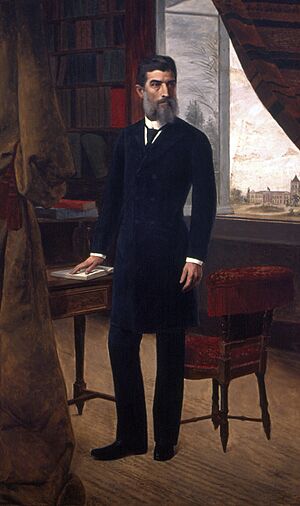Prudente de Morais facts for kids
Quick facts for kids
Prudente de Morais
|
|||||||||||||||||||||
|---|---|---|---|---|---|---|---|---|---|---|---|---|---|---|---|---|---|---|---|---|---|
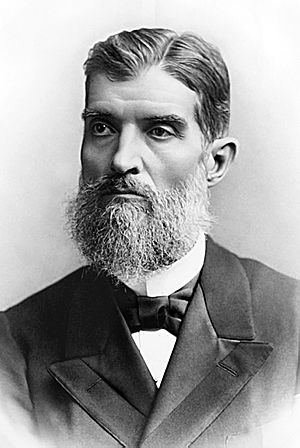
Official portrait, 1894
|
|||||||||||||||||||||
| President of Brazil | |||||||||||||||||||||
| In office 15 November 1894 – 14 November 1898 |
|||||||||||||||||||||
| Vice President | Manuel Vitorino | ||||||||||||||||||||
| Preceded by | Floriano Peixoto | ||||||||||||||||||||
| Succeeded by | Campos Sales | ||||||||||||||||||||
| Vice President of the Federal Senate | |||||||||||||||||||||
| In office 19 June 1891 – 9 May 1894 |
|||||||||||||||||||||
| Preceded by | Brás Carneiro | ||||||||||||||||||||
| Succeeded by | Ubaldino do Amaral | ||||||||||||||||||||
|
|||||||||||||||||||||
| Personal details | |||||||||||||||||||||
| Born | 4 October 1841 Itu, São Paulo, Empire of Brazil |
||||||||||||||||||||
| Died | 3 December 1902 (aged 61) Piracicaba, São Paulo, Brazil |
||||||||||||||||||||
| Political party | Liberal (until 1873) PRP (1873–1893) PRF (1893–1902) |
||||||||||||||||||||
| Spouse | Adelaide de Morais Barros | ||||||||||||||||||||
| Signature | |||||||||||||||||||||
Prudente José de Morais e Barros (born October 4, 1841 – died December 3, 1902) was a Brazilian lawyer and politician. He became the third President of Brazil. He was special because he was the first president who was not a military leader. He was also the first to be chosen by a direct vote from the people. His time as president lasted from 1894 to 1898. During this time, a big peasant revolt called the War of Canudos happened, which the Brazilian army stopped. He also helped fix a problem in Brazil's relationship with Portugal, with help from Queen Victoria of the United Kingdom.
Before becoming president, he was the Governor of the State of São Paulo. He also led the Senate from 1891 to 1894. He was the head of the group that wrote Brazil's first republican rulebook, the 1891 Constitution. A city in São Paulo, Presidente Prudente, is named after him.
Contents
Who Was Prudente de Morais?
Early Life and Education
Prudente de Morais was born near Itu, in the state of São Paulo, on October 4, 1841. His family came from early Portuguese settlers in Brazil. When he was three, his father, who bought and sold animals, was sadly killed. After his mother remarried, Morais moved to the city. There, he finished primary school.
In 1863, he earned a law degree from the Law School of São Paulo. He then moved to Piracicaba and worked as a lawyer for two years. In 1866, he married Adelaide Benvinda da Silva Gordo in Piracicaba.
Starting His Political Journey
Morais started his political career in 1865. During the time Brazil was an empire, he first joined the Liberal Party. He believed in having a king or queen (a monarchist). In 1865, he was chosen as an alderman, which is like a city council member, and he led the city of Piracicaba.
In 1873, he joined the Paulista Republican Party (PRP). He then became a republican, meaning he believed Brazil should be a republic with an elected leader, not an empire. He served as a representative in the state assembly.
He also became a state representative in São Paulo and a national representative in the Empire's General Assembly. He supported a republican government, ending slavery, and giving more power to the states (federalism). He was very good at solving problems about the borders between São Paulo and Minas Gerais.
After Brazil became a Republic in 1889, his party became very important. Morais was chosen as a Senator for São Paulo. Because he was a leader in his party, he was picked to be the President of the group that wrote Brazil's first republican rulebook, the 1891 Constitution.
Morais ran in the first Brazilian presidential election in 1891. However, he lost to Deodoro da Fonseca, who was already leading the temporary government. After the Constitution was finished, Morais's job as President of the group ended. He was then chosen as the Vice-President of the Federal Senate, which is the upper house of the government.
In November 1891, President Deodoro da Fonseca tried to take all power, but he had to resign. The Vice-President, Floriano Peixoto, then became president. This left the Vice-Presidency empty. So, Morais, who was Vice-President of the Senate, became the President of the Senate.
Becoming President of Brazil
In the election to choose the next president after Floriano Peixoto, Morais was chosen by the Republican Federal Party. He won the presidential election on March 1, 1894. He officially took office on November 15, 1894. This made him the first President of Brazil chosen by a direct vote from the people. He was also the first president who was not a military person. Prudente received many votes, much more than his main opponent, Afonso Pena. His vice-president was Dr. Manuel Vitorino Pereira. His election meant that powerful coffee farmers from São Paulo now had more control in politics, instead of the military.
Facing Challenges as President
Prudente de Morais's four years as president were full of challenges. There were political disagreements and ongoing fighting in Rio Grande do Sul. This was part of the Federalist Revolt (1893–1895). Early in his presidency, he managed to end this fighting by signing a peace agreement with the rebels. They were also forgiven for their actions.
Later, Prudente de Morais worked hard to bring peace among different political groups in Brazil. Some groups strongly supported the previous president, Floriano Peixoto, while others wanted the monarchy back. He slowly changed some of Floriano Peixoto's policies. He had to be careful because Floriano's supporters, especially in the army, still had some power. Even his own vice-president had similar ideas to Floriano.
In 1896, he faced a problem with the British. They tried to take over the islands of Trindade and Martim Vaz in 1895. There was also a revolt at the Military School. Morais showed his authority by closing the school and a military club. The problem with the British was solved, and Brazil kept the islands.
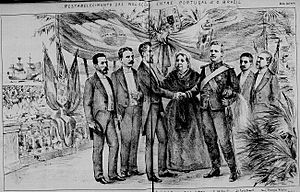
Prudente de Morais also made friends with Portugal again. He signed a friendship agreement with Japan in November 1895. This was to encourage Japanese people to move to Brazil.
But soon after the fighting in Rio Grande do Sul, he faced an even bigger problem: the War of Canudos. This was a rebellion in the countryside of Bahia.
Due to needing surgery, Prudente de Morais took a break from November 10, 1896, to March 4, 1897. His responsibilities were given to Vice-President Vitorino during this time.
When the rebels led by Antônio Conselheiro won some battles in the War of Canudos, the political situation got worse. Prudente stopped his recovery and appointed General Carlos Machado de Bittencourt to lead a new army to defeat the rebels.
Disagreements within his own party and the War of Canudos made his government weaker. Even after the government troops won the war, tensions remained high. On November 5, 1897, during a military event, someone tried to kill Morais. He was not hurt, but his war minister, Carlos Machado de Bittencourt, died while protecting him. The president then declared a state of emergency in the capital city. This allowed him to deal with his most difficult opponents.
Important Decisions and Achievements
The country also faced a tough economic situation. This was partly due to money problems from before his time, military spending, and more debt to other countries.
With advice from his finance ministers, Rodrigues Alves and Bernardino de Campos, Prudente talked with British bankers. He managed to combine Brazil's debts into one big loan, which helped the country's finances. This was called a funding loan.
In foreign policy, there was a disagreement about the border with Argentina. The U.S. President Grover Cleveland helped them decide. The decision was in Brazil's favor. Historians say this success was thanks to the hard work of Brazil's representative, the Baron of Rio Branco, whom Morais had chosen for the talks.
See also
 In Spanish: Prudente de Morais para niños
In Spanish: Prudente de Morais para niños
 | James B. Knighten |
 | Azellia White |
 | Willa Brown |


